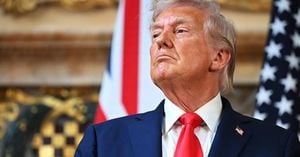The Pentagon found itself at the center of a political and media storm this week after reports surfaced suggesting military leaders were considering a new recruitment campaign centered around the legacy of Charlie Kirk, the conservative activist and founder of Turning Point USA, who was assassinated last week in Utah. The controversy, which has rapidly escalated into a national debate, highlights the challenges facing U.S. military recruitment and the broader cultural divides influencing public service in America.
On September 20, 2025, Pentagon Press Secretary Kingsley Wilson issued a forceful denial of an NBC News report that claimed top military officials were weighing a campaign to honor Kirk by encouraging young people to join the armed forces. According to NBC News, two anonymous officials alleged that Undersecretary of Defense for Personnel and Readiness Anthony Tata was leading an initiative to launch a national call to service, potentially using slogans such as “Charlie has awakened a generation of warriors.” The report also suggested that Turning Point USA chapters across the country could serve as military recruitment centers, with recruiters attending events and advertising at these chapters.
Wilson, speaking to Fox News, dismissed the report in no uncertain terms, stating, “This is not happening, yet Fake News NBC published this report as if it were true using anonymous sources with no knowledge of what the recruitment task force at DOW is working on.” He described the NBC News account as “100% wrong” and accused the outlet of “publishing false claims based on anonymous sources.”
Despite the Pentagon’s categorical denial, the NBC News story quickly gained traction. The network’s reporting, by Courtney Kube, cited unnamed officials who said the campaign was being considered as a way to tap into Kirk’s influence among young conservatives and Trump supporters—demographics that overlap with the age group typically targeted by military recruiters. The officials noted that President Donald Trump had credited Kirk and Turning Point USA with helping to secure his 2024 election victory.
According to NBC News, the proposed campaign was still in the discussion phase and faced significant internal resistance. Some Pentagon leaders reportedly warned that such a move could be seen as the military exploiting Kirk’s assassination for political gain. These concerns were heightened by the fact that Kirk himself had never served in the armed forces, raising questions about the appropriateness of tying his legacy to military service.
The aftermath of Kirk’s assassination has seen an outpouring of public tributes from high-ranking officials. Vice President JD Vance, described as a close friend of Kirk, traveled from Washington, D.C., to Utah to escort Kirk’s wife and remains back to Arizona. Kirk’s casket was carried to Air Force Two by members of the military, and a memorial service scheduled for Sunday, September 21, 2025, in Arizona will feature remarks from President Trump, Vance, Defense Secretary Pete Hegseth, and other Cabinet members.
In a further sign of the administration’s efforts to honor Kirk, Defense Secretary Pete Hegseth reportedly directed staff to actively search for any military personnel or Defense Department employees who mocked or condoned Kirk’s death, with the intention of punishing those individuals. Hegseth also called on the public to report any critical social media posts about Kirk from people associated with the military, as NBC News has previously reported.
Chief Pentagon spokesman Sean Parnell, in a statement provided to NBC News, accused the media of fabricating stories to undermine the administration’s achievements. “The media is so desperate to attack this administration’s success that they are now inventing lies about our recruitment efforts,” Parnell said. He went on to praise the “strong leadership of President Trump and Secretary Hegseth,” asserting that “men and women are coming out in droves to serve this great nation.”
The debate over the alleged campaign comes at a delicate moment for U.S. military recruitment. The Pentagon’s Military Service Recruitment Task Force, co-chaired by Tata, has been grappling with warnings of a possible future shortfall in recruits. While Trump and Hegseth have touted a recent uptick in enlistment since Trump’s inauguration, defense officials acknowledge that the trend began under President Joe Biden, following two years of shortfalls in 2022 and 2023. The uptick, however, may be fleeting.
Parnell addressed these challenges in a July news briefing, noting that only 7% to 11% of Americans now see military service as a viable path forward, compared to 27% in the years following 9/11. He explained, “While we have great recruiting numbers now, it might not always be the case. And so one of the things that we’re trying to achieve with this recruiting task force is answering the tough question about how do we set the conditions here culturally in this country to have more kids want to serve the country and see it as a viable career path.”
Societal and generational changes are contributing to the recruitment dilemma. The U.S. experienced a sharp drop in births after the 2007 economic downturn, which has now translated into a smaller pool of eligible recruits. Additionally, there are fewer parents with military backgrounds, meaning fewer “military kids” following in their parents’ footsteps. Eligibility hurdles have also grown, with more young people failing to meet physical, academic, or medical requirements—often due to obesity, low test scores, or a history of taking disqualifying medications such as antidepressants. The Covid pandemic further compounded these issues, fueling the shortfalls seen in recent years.
The military has responded with new initiatives to boost recruitment. In 2022, the Army launched the Future Soldier Preparatory Course, aimed at helping young people improve their fitness and scores on the Armed Services Vocational Aptitude Battery (ASVAB) test. Nearly 50,000 men and women have completed the course and advanced to basic training, according to the Army. However, defense officials told NBC News that much of the recent recruitment rebound in 2024 and 2025 has come from the military pouring billions of dollars into recruiting and retention bonuses.
While the Pentagon’s recruitment task force continues to develop strategies to address these challenges, none of its reports have been made public. Hegseth was reportedly briefed last month on the task force’s findings, which included concerns about a looming shortfall in eligible recruits. The debate over the potential Kirk-inspired campaign, whether real or rumored, underscores the urgency and sensitivity surrounding military recruitment efforts in an era of shifting demographics and deep political polarization.
As the story unfolds, the Pentagon’s denial stands firm, but the questions raised by the NBC News report—about the intersection of politics, legacy, and public service—are likely to linger long after the headlines fade.




